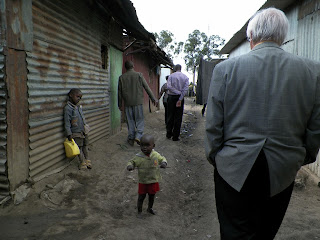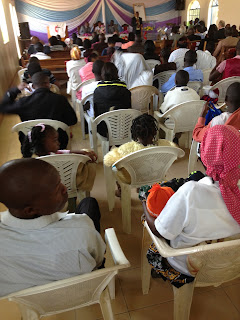Most of my clergy career has been spent serving in a congregation. For over 25 years I've served in 4 different states and in churches ranging from rural to urban. I've also worn my "clergy hat" beyond the congregation and served in district and conference capacities. While I certainly had a theology of church and Church, I confess I have only recently grasped in deeper ways the incredible opportunity of being a global denomination.
This confession should be taken rather seriously as I'm rather individualistic and free minded in my thinking. I tend prefer the church in action rather than the church in unending committee meeting and discussion. I'm a Watergate child. I don't trust institutions very easily. I can recall many church conversations where I'd complain that an institution is too slow. Or too complex. Or too removed from reality. Or inattentive to the congregation. Or even an impediment to a congregation prone to action.
This isn't to say I'm provincial, or operating out of a particular theological or "soap box" perspective. I've always liked the action oriented mission crowd, so found myself falling in with the folk who like to make a difference in the world and put faith into action. So over the years I have been involved in international mission, and continued to make myself available to serve the church and the Church, and in big ways and small ways have tried to be a "team player."
If you are open to being a "team player" for God and your church you can never tell where it will lead you.
So, now I've recently taken on a different role and serve on an annual conference connectional ministries staff and part time with our denominational mission agency. Long time clergy friends either laugh as they call me "bureaucrat" or run the other way as they suspect I want something from them.
Really, all I want is for everyone to "play on the same team."
The reality is that as I've moved into a place where I go much deeper than the annual "sales pitch" for mission I'd hear at a clergy meeting at district or conference I'm realizing how disengaged many of our congregations have been in United Methodist mission. And I wonder if that is part of the reason for our decline in the United States.
I admit I'm rather shocked at everything I didn't know about our United Methodists mission!
I thought I had a good variety of long term mission partnerships in a dozen countries with 20 years of international immersion. Turns out I was still in the shallow end of the pool.
How could I have been in so many meetings over the years and not gotten the implications of my involvement, or lack of it, and the impact that has both on congregation and the Church around the world? What churches and clergy do, or don't do, in these regards has real consequences!
How did I miss that if I'm lukewarm toward my denomination, in my active involvement and support that, it has impact both on my following of Christ and my leadership and development of laity?
How have I missed that there is a powerful international movement of Methodism that still needs the U.S. churches to be partners, supporters, and encouragers despite what might be happening in our particular congregation.
I admit I'm, to use the great old Methodist phrase, convicted in these regards.
It would be- and this is akin to heresy for anyone who is a real fan and supporter of their favorite college football team- like saying you are a fan of the University of Georgia (or name
your team) but when it comes down to it not being fully invested and supportive and saying
any team is as good as any other.
How did I miss that it is stronger to be part of my global team and there is much to learn and experience beyond my congregation and people like me?
This is equally as ironic to imagine we have the skills and capabilities to know best, do best, and really do no harm while making a lasting difference for Church and Kingdom of God. I can barely manage a small piece of this in communities and churches I've spent a lifetime in. Throw me in a different culture, country, or context and who knows what I'll do.
I've spent the last couple of days with my part time work with
Global Ministries attending meetings as Mission and Evangelism works on all the various elements requiring their attention. Now, I've been in congregational mission conversations in very active, enthusiastic churches, for over 2 decades. But I've never been at the table with such talented, called people with expertise in ethnic and cultural issues, contextual mission, best practices, administrative excellence, and an everyday passion for their work as individuals and a team committed to advancing the work of The United Methodist Church in mission.
Imagine being at a table with 20 people from a dozen countries, most able to speak multiple languages (when you barely speak one!), who pray, talk, think, and work on mission every day.
It's staggering really!
I was blessed to sit in on conversations Monday that discussed missionaries and placement locations on 5 different continents. They discussed various ethnic groups who were being reached. They discussed various ministries as they considered church development and community development. They considered those things that had proven effective in ministry in certain places, as well as those practices or personnel who had not done as well. They talked about partnerships, and funding, and "next steps." My team, which I hadn't always claimed or supported, are exceptionally gifted, knowledgeable, passionate missionary people.
Imagine being in a conversation where there is so much said in each sentence, shared quickly in conversational style, among 20 of the sharpest people you know, and you'll get a sense of how I felt Monday. They were often, literally, speaking another language. It was akin to sitting at the feet of the most brilliant preacher or teacher you know that says so much in any one thought that you hang on to every word and find yourself thinking back through the powerful phrases. I found myself repeatedly scribbling notes thinking, "I didn't know that." "There are Methodists in
that country." "I want to know more about that and will need to study more." "Talk to ________ later about that."
As I sat, in awe of the global work of our United Methodist Church, I was impressed by the work and the incredible team/s who help us to be in mission in these days.
And, I had a disturbing thought.
It turns out that for too long I had too small a team in mission. I had discounted
my team and too often gone an independent route, or perhaps even worse, affiliated with organizations that weren't part of my team. At times I may have even been party to aiding mission organizations and churches working in the neighborhood of Methodist or United Methodist churches in other countries.
Now, before you argue "It's all good for God's Kingdom" (a topic for another blog) just imagine how you and your congregation would feel if outsiders from another country rolled into your town and spent a week on a "mission project," or a year or years of funding and support, of a competitor. Please feel that pinch and seriously consider how you would feel. And know this is my confession, so my primary hope in sharing is that you might learn from my mistakes.
These are some of the many impressions which struck me in a profound way Monday.
Sure, I always had my U.S. church based team, and I had UMVIM, and I had the host/receiving missionary or Methodist/United Methodist conference. All powerful, committed, competent teams. But I didn't realize there was a much larger, accomplished team engaged in this tough work day after day. Somehow I forgot that I had at my fingertips some denominational resources, my larger team, which I'd either overlooked or forgotten.
Well, truth be told, I knew, but I bypassed them.
I, and my congregation, thought we'd have more control if we pushed forward. I assumed we could do things more quickly and effectively. I didn't want to wait on anyone else or have anyone, or any group, hinder what I thought was best.
But I forgot we are on the same team.
I forgot that if my congregation did work in an international country, and the Methodists or United Methodists didn't know about us, how offensive that would be (unless I imagine for a moment how we'd feel if a church from another country came into my town to "do mission" and operated in similar fashion).
I forgot how my denominational mission agency could multiply our funding, our effectiveness, and minimize our mistakes. I forgot they could help with building more churches for a mission cause. I feared they would want to control, but it turns out they want to be good stewards and maximize the prayers, funding, and participation. I forgot about the power of connectional mission and lapsed into congregational mission.
It turns out that rather than being a great team player and team builder I was fracturing the impact, diminishing the efforts, and pursuing a course of action we at a congregational level could control and feel good about, but...
As I sat around the table today and heard African perspectives, and Asian insights, and European ideas, and Latin American dreams I realized my team just hadn't been big enough to do what God wants of us and what we had always yearned for in mission.
Now, I know, some clergy and churches who practice a more congregationally based approach to mission will chastise me for so quickly having drunk the Kool-Aid. But, in all of the best sense, my experience with Global Ministries is like those very best experiences I've had- at congregation, district, and annual conference levels- when United Methodist conference well. There is a power and presence of God, a guidance of Holy Spirit, and a renewed vitality of the Body of Christ when we listen, and learn, and act together as a team unified in this missio Dei. There is a wisdom and effect in connectional mission which I am eager to re-discover and to energize with GBGM and with congregations all over the world.
Perhaps you and your congregation will want to be part of this journey as we renew a United Methodist approach to connectional mission which revitalizes congregations all over the world, which shares a good witness in word and deed of the Good News of Christ, and which launches more congregations as people are transformed in discipleship. I'm realizing that to be "connected in mission" is good thing as God draws together a team large enough to reach this incredible, diverse world.
I'm gladly claiming
my team!
































